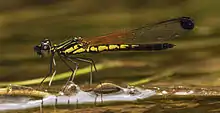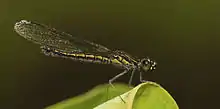Libellago indica
Libellago indica,[1] the southern heliodor,[2] is a species of damselfly in the family Chlorocyphidae. It is found only in South India. It breeds in hill streams and rivers.[3][4]
| Libellago indica | |
|---|---|
 | |
| Male | |
 | |
| Female | |
| Scientific classification | |
| Domain: | Eukaryota |
| Kingdom: | Animalia |
| Phylum: | Arthropoda |
| Class: | Insecta |
| Order: | Odonata |
| Suborder: | Zygoptera |
| Family: | Chlorocyphidae |
| Genus: | Libellago |
| Species: | L. indica |
| Binomial name | |
| Libellago indica (Fraser, 1928) | |
| Synonyms | |
| |
Fraser described this damselfly in 1928 as a subspecies of Libellago lineata.[5][6] Most authors have followed Fraser's original view for a long time, although Lieftinck considered L. indica as a good species (Lieftinck, 1940,p. 88; 1955, p. 68; 1971,p. 206). Recently De Fonseka 2000, Hämäläinen 2002[7] and World Odonata List[1] listed L. indica as a good species.
Description and habitat
It is a small damselfly with large head and brown capped yellowish eyes. Its thorax is black with yellow marks. Wings are transparent with apical black spots on the fore-wings. The abdomen is black with large yellow spots on lateral sides on segments 2 to 7. Segments 2 to 5 have broad mid-dorsal black stripes which is absent in L. lineata lineata. These abdominal markings will help to easily distinguish it from other Libellago lineata. Female is dull brown and with transparent wings. Sub-adult males have also transparent wings.[5][6]
.jpg.webp) Mating
Mating_laying_eggs_(Ovipositing)_(35796989793).jpg.webp) Egg laying
Egg laying
It is common on the banks of rivers and streams flowing through the forests. Frequently found sitting in emergent water plants and overhanging bushes. It breeds in hill streams and rivers.[6]
References
- Paulson, D.; Schorr, M.; Abbott, J.; Bota-Sierra, C.; Deliry, C.; Dijkstra, K.-D.; Lozano, F. (2023). "World Odonata List". OdonataCentral, University of Alabama. Retrieved 14 Mar 2023.
- "Libellago indica Fraser, 1928 – Southern Heliodor". Odonata of India, v. 1.00. Indian Foundation for Butterflies. Retrieved 2018-10-06.
- K.A., Subramanian; K.G., Emiliyamma; R., Babu; C., Radhakrishnan; S.S., Talmale (2018). Atlas of Odonata (Insecta) of the Western Ghats, India. Zoological Survey of India. pp. 78–79. ISBN 9788181714954.
- "Libellago indica (Fraser, 1928)". India Biodiversity Portal. Retrieved 2018-10-06.
- Fraser, F. C. (1928). "Indian dragonflies. Part XXXII". The Journal of the Bombay Natural History Society. 32: 686–687.
- C FC Lt. Fraser (1934). The Fauna of British India, including Ceylon and Burma, Odonata Vol. II. Red Lion Court, Fleet Street, London: Taylor and Francis. pp. 63–65.
- Hämäläinen, M. (2002). "cover Notes on the Libellago damselflies of the Andaman and Nicobar Islands, with description of a new species (Zygoptera: Chlorocyphidae)". Odonatologica. 31 (2002): 345–358.
![]() Media related to Libellago indica at Wikimedia Commons
Media related to Libellago indica at Wikimedia Commons